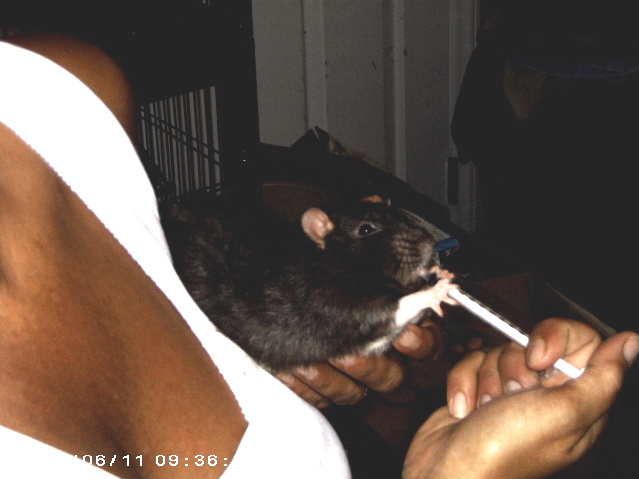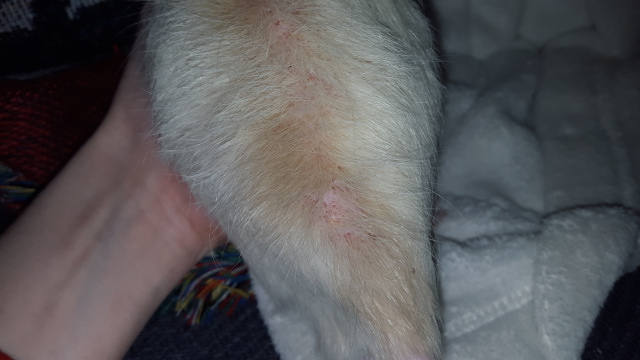QuestionQUESTION: Hi Sandra,
I have a great female rat (Prima) who is 33 months old, just in the last two weeks she has been showing signs of hind leg paralysis due to spine degeneration. In one of your previous answers you mentioned owners can easily give rats with this condition something like metacam by buying children's ibuprofen and giving it to her.
You wrote that you could tell a safe dose if you knew her weight, and I was wondering if you could please do this for Prima? She is 11oz (her regular weight since adulthood, luckily she isn't losing weight).
Things are going well for her so far, traveling across the apartment floor is still giving her great joy, although it is at a much slower pace, and her tail is held up (sometimes, sometimes not) So it seems she is not doing so bad at this point, still anything we can do to keep the smile in her eyes is worth it.
ANSWER: Sure, for childrens motrin/ibuprofen, she can take .10cc of it, (or .1, depends on the markings on your syringe) which doesnt seem like much, but it works. A 2lb rat takes around .25 ccs. Give it to her two times a day.
---------- FOLLOW-UP ----------
QUESTION: Thanks so much! At the drugstore they sold children's ibuprofen in 100mg/5ml or 200mg/5ml, they didn't have motrin. I got the lower thinking that to little wouldn't hurt while too much may. If motrin is 200mg can I give her .2 of this instead?
AnswerThe proper dose give or take a drop is:
15 mg/lb to 60 mg/lb. The high end dose is for both pain and swelling. She should have as stated above if you bought the 100mg/5ml.
How are things going, by they? Did you read over my web page on my website about the elderly rat? There is even a recipe on a dietary supplement that some claim have helped rats with this condition tremendously. There are some skeptics, of course, but its worth a look. Here is the URL to my site and to the page in particular on this condition often seen in elderly rats:
http://www.freewebs.com/crittercity/careoftheelderlyrat.htm

 pet rat with swollen face/ abcess
QuestionQUESTION: My pet rat has a swollen cheek with a
pet rat with swollen face/ abcess
QuestionQUESTION: My pet rat has a swollen cheek with a
 I dont know if its mites
QuestionQUESTION: I just recently lost one of my boys t
I dont know if its mites
QuestionQUESTION: I just recently lost one of my boys t
 Weird bumps
Question
bumps
Hello Im Teeona. Friskey my rat h
Weird bumps
Question
bumps
Hello Im Teeona. Friskey my rat h
 Ratty baba
QuestionPaws yawning.
QUESTION: Hello.
I have a
Ratty baba
QuestionPaws yawning.
QUESTION: Hello.
I have a
 follow up
QuestionUpsidedown Twitch
QUESTION: I found out
follow up
QuestionUpsidedown Twitch
QUESTION: I found out